Ş. Aryel – Ş. Kendal – Ş. Gabar – Ş. Mehmet – Ş. Destan – Ş. Kendal
We remember our Şehîds of May
Aryel Botan – Mohamad Hosein Karimi
Date and Place of Birth: 19 January 1990 – Tehran, Iran
Date and Place of Martyrdom: 9 May 2015 – Gundê Til Boxa, Serêkaniyê
Şehîd Aryel traveled to Kurdistan in 2015 and went to Rojava to join the war against Daesh. He spoke on video shortly before he fell: “I joined YPG to fight against the religious tyranny of Daesh,” adding that “This tyranny has destroyed religion and threatened the world. They say that the caliphate that is for God is better than human freedom.” He gives us a glimpse of his vision for a world where “one day all human beings will live as humans in a free and moral society.” Şehîd Aryel Botan was martyred in combat against Daesh terrorists at the front near Serêkaniyê on 9 May 2015.
“We say God created humans as free beings. This is sacred.”
Kendal Qehreman – Mário Nunes ![]()
Date and Place of Birth: 23 January 1994 – Sagres, Algarve, Portugal
Date and Place of Martyrdom: 3 May 2016 – Til Temer
Mário Nunes was born in 1994 in Portugal. He served with the Portuguese Air Force, but grew increasingly dissatisfied with the inaction of his country in face of the terrorist regime of Daesh, and deserted from his post at Beja Airbase, Portugal. In February 2015, he arrived in Rojava and joined the YPG through the Lions of Rojava. In Rojava he took on the nom-de-guerre “Kendal”. Growing up in the small town of Sagres in the picturesque Algarve region of Portugal, as a youth he had a deep interest in all things military, and had no doubt what path he would pursue in his life. Excelling in English at school, he would read books about military and historical topics. The walls of his room were adorned with posters of the Portugeuse Air Force. Perhaps this was in part due to the influence of his father’s family, many of whom had served in the military. With an independent spirit, he was eager to leave the family home and begin his military career. At the age of 18, he joined the Portugeuse Air Force. Although initially thrilled with his new life, over time he grew disillusioned with what he felt was the hypocrisy of military life. Mário wanted to make a positive difference in the world, and did not see an opportunity to do this through the Portugeuse military. He was eager to participate fully in military actions. Like many of the internationalist fighters who came to Rojava, he wanted to be at the forefront of the fight against the terror regime of ISIS which was spreading like a plague across the Middle East and other parts of the world.
In September of 2014, he travelled to Turkey, and made an attempt to join the Peshmerga in Iraqi Kurdistan. After a long interrogation, he was turned for home, his attempt unsuccessful. But Mário Nunes did not give up. In February 2015, he travelled again to Turkey, but this time his destination was Syria. After crossing the border with the help of the comrades, he joined the YPG. Having initially taken a great deal of his annual leave, he ended up deserting from the Portuguese Air Force by remaining in Rojava. During his first time in Rojava, he developed his military skills and became a solid and dependable fighter. Later in 2015, he left Rojava and returned to Syria in January 2016. Heval Kendal fought in numerous operations, in Tel Temir and Shaddadi among other places. By all accounts, he was a brave and capable fighter who brought a great deal to his comrades.
Speaking about his motivation for joining the fight for democracy in Syria, he said: “I am here to fight with the people of Rojava on behalf of the Portuguese people. This is a cause worth fighting for. A new movement is arising here. This is true democracy. This is a revolution that everyone should support and praise.”
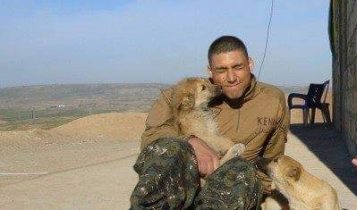 An article written by members of Solidarity Platform with the People of Kurdistan gives some insight into the last days of Heval Kendal: “[…] The pressures imposed by the capitalist world on the revolution would eventually victimize Kendal, who heard that the liberal media in Portugal was demonizing him, comparing him to the IS jihadists he was fighting against. Unable to return home due to the closing of borders by the international blockade, Kendal felt the pressures of war turning to depression. Driven to despair by these psychological assaults, Kendal would eventually fall on 3 May 2016. The death of Şehîd Kendal Qehreman may not have been by enemy fire, but it is nonetheless a death resulting from war, the result of the total sacrifice he made for the Rojava Revolution and its peoples, a sacrifice that raises him to the status of Şehîd and makes him worthy to be remembered by all of us. Şehîd Kendal did not fail or lose the war. In fact, from the moment he left for Kurdistan, it was impossible for him to be defeated. He showed our generation, desperate as it is for something that makes sense in the dissonance of the liberal world, that a better world is possible. […] Şehîd Kendal Qehreman has revealed to us that the age of heroes has not ended; that heroes are not distant beings at the ends of the earth; that it is not only the Kurds who can bring about a better world, but the Portugeuse and any other people. The revolution, the better world that is formed, is not only possible in Rojava, but in Portugal, all over the world. As Şehîd Kendal would say, ‘One world, one people’. And that is what we seek, above anything else.”
An article written by members of Solidarity Platform with the People of Kurdistan gives some insight into the last days of Heval Kendal: “[…] The pressures imposed by the capitalist world on the revolution would eventually victimize Kendal, who heard that the liberal media in Portugal was demonizing him, comparing him to the IS jihadists he was fighting against. Unable to return home due to the closing of borders by the international blockade, Kendal felt the pressures of war turning to depression. Driven to despair by these psychological assaults, Kendal would eventually fall on 3 May 2016. The death of Şehîd Kendal Qehreman may not have been by enemy fire, but it is nonetheless a death resulting from war, the result of the total sacrifice he made for the Rojava Revolution and its peoples, a sacrifice that raises him to the status of Şehîd and makes him worthy to be remembered by all of us. Şehîd Kendal did not fail or lose the war. In fact, from the moment he left for Kurdistan, it was impossible for him to be defeated. He showed our generation, desperate as it is for something that makes sense in the dissonance of the liberal world, that a better world is possible. […] Şehîd Kendal Qehreman has revealed to us that the age of heroes has not ended; that heroes are not distant beings at the ends of the earth; that it is not only the Kurds who can bring about a better world, but the Portugeuse and any other people. The revolution, the better world that is formed, is not only possible in Rojava, but in Portugal, all over the world. As Şehîd Kendal would say, ‘One world, one people’. And that is what we seek, above anything else.”
The body of Şehîd Kendal was later repatriated to his native Portugal. Comrades both local and international paid tribute to the bravery of Heval Kendal in his fight against the Islamic State at a martyr’s ceremony at that Semalka border crossing between Syria and Iraq. A funeral service was held in the Church of São Tiago, in Portalegre, attended by friends, family, comrades and representatives of the Kurdish community, before he was finally laid to rest.
A book about Şehîd Kendal titled ‘Heróis Contra O Teror: Mário Nunes, O Português Que Foi Combater O Estado Islâmico’ (Heroes Against Terror: Mário Nunes, A Portugeuse Man Who Fought Against the Islamic State) was published in Portugeuse in November 2016.
![]() Gabar Amed – Jamie Bright
Gabar Amed – Jamie Bright
Date and Place of Birth: 4 November 1971 – Victoria, Australia
Date and Place of Martyrdom: 25 May 2016 – Gundê Malha, Şadaddî
Jamie Bright was born in Australia in 1971. He first came to Rojava December 15, 2015 to fight against the tyranny of Daesh. In Rojava, he took on the nom-de-guerre “Gabar Amed” . A dedicated individual, he stayed far beyond the normal 6 month commitment time frame. In his 17 months in Rojava, Heval Gabar became fluent in Kurdish and integrated himself into the life of Rojava. “The reason I came to Kurdistan is because of the people, their struggle and their fight… I came to help them in any way I can…I will stay until it is finished.”
As a former Australian Army engineer, Heval Gabar put his skills to work in disarming booby traps, mines and IEDs that were laid by the Islamic State, to protect both his comrades and the civilian population. “I hope people at home take heart that there are people like Jamie in the world,” said a comrade of his. “He left the safety of Australia to protect weak and innocent people in the Middle East. He was a consummate soldier and passionate humanitarian. His big heart was only matched by his bravery.”
“Heval Gabar stayed fighting on the frontline unconcerned with popularity and self promotion because he was content to let the people of the land and their fight for liberation shine; because he was a true believer of the revolutionary, democratic system that we are trying to create in Rojava; and this marks true solidarity, true informed solidarity that does not try to dominate and take over, does not impose and direct, but lends a gentle, loving, supportive hand.” – said one of Heval Gabar’s comrades in memorial.
Şehîd Gabar Amed was martyred alongside several other comrades on 25 May 2016 when an outpost he was defending was ambushed by Daesh. He was honoured in a martyr’s ceremony in Rojava before his body was returned to Perth, where he was laid to rest.
Ulaş Bayraktaroğlu – Mehmet Kurnaz ![]()
Date and Place of Birth: 1976 – Turkey
Date and Place of Martyrdom: 9 May 2017 – Raqqa
Ulaş Bayraktaroğlu was born into a socialist family in Turkey in 1976. At a time of great social upheaval and political violence in Turkey, Ulaş was organized as a revolutionary from a young age. His mother explains, “My son was mischievous. He was always active. At the age of 16 he joined the revolutionary struggle. He was working non-stop.”
As early as the 1990’s, with the guerrilla war in Kurdistan and the repression of the Turkish state against the Kurdish people at a high level, Ulaş was determined to go. “When he was 17, he told me that he wanted to join the Kurdish movement,” says his mother. “‘There’s a war there, I have to go there,’ he said. I was also afraid that there is death there. There are bad things. I was trying to persuade him not to go. I said to Ulaş, ‘It is up to us to organize the working class here’. When I woke up in the morning, Ulaş was igniting a piece of paper on the quilt with a pin. The paper said, ‘Mom, you are right, we must continue our struggle in the west’. But in the end, he got what he wanted. He achieved his dreams. After so many years, he went to Rojava and fought shoulder to shoulder with the Kurds.”
At 19 years of age, in 1995, Heval Ulaş became a member of the United Socialist Party and like many revolutionaries before him, robbed a bank in order to fund his activities. He was later caught, wounded, during a clash with the police, arrested and put in prison. “He never remained idle in prison, either,” his mother remembers. “He joined the hunger strike for the closing of F Type prisons . He rebelled against injustice in prison. He participated in the riots. He was organizing in prison. He was talking about socialism. He was well respected in prison. He continued to work at the same pace he always did.” He was released in late 2000 as part of a general amnesty, and immediately returned to his revolutionary works. In 2010 Heval Ulaş was a member of the Socialist Democracy Party (SDP) Central Executive Board. He was arrested on 24 September 2010, along with 8 other people, on the grounds that he had contact with the illegal Marxist organisation Devrimci Karargah (Revolutionary Headquarters). Heval Ulaş was imprisoned for 11 months. Heval Ulaş got married in prison. He and his wife would later have a daughter together in 2013, who they named Dünya Kurtuluş (World Liberation). Once again Heval Ulaş returned to his revolutionary works undaunted. Like many of the Turkish revolutionaries who joined the fight in Rojava, Heval Ulaş was at the forefront of the barricades of the Gezi Park Uprising, the massive insurrection against the AKP regime in 2013 which gave new life to the revolutionary movement in Turkey. He was arrested for his part in the clashes during the Gezi Uprising on 15 June 2013. Soon after his release on 25 March 2014, he left Turkey and crossed into Başûr, where he joined the guerrillas in the mountains of the Medya Defence Zone. In the mountains he took on the nom-de-guerre Mehmet Kurnaz. After his time in the mountains, he travelled to Rojava, where he was instrumental in the founding of BÖG (United Freedom Forces), the International Freedom Battalion and the DKP (Revolutionary Communards Party). As the commander of the IFB and BÖG, he dedicated himself fully to the eradication of the ISIS gangs and the liberation of the people of Rojava.
“A leader is a person who does things that no one thinks of, when no one else thinks, in a way that no one can predict or think about,” one comrade reflects. His comrades remember him as “the sea-eyed storm-hearted vanguard of the revolution. Neither land nor water nor flowing rivers and flowing stars will easily accept the loss of the revolution’s solid reliable comrade. He looked at freedom with longing and care, as with a lover. To reach him, he clung to the people’s war and weapon. He sought reality in the lands of Rojava. Without giving up, without a break, He worked without even for a moment accepting his task as ‘complete’. He rested not even for a moment and ran towards freedom without pausing for breath. Because the commander Ulaş knew and believed very well that the endless tasks of the revolution could not be fulfilled and its long march could not be completed with ordinary weak steps and slow tempo.”
Heval Mehmet led the IFB against the Daesh gangs from Kobanê to Minbic, from Minbic to Raqqa. He fell şehîd on 9 May 2017 in the battle for Raqqa, during the battle to liberate the Daesh capital. His spirit lives on in the united forces of struggle he was so instrumental in creating.
![]() Destan Temmuz – Ayşe Deniz Karacagil
Destan Temmuz – Ayşe Deniz Karacagil
Date and Place of Birth: 23 August 1993 – Ankara
Date and Place of Martyrdom: 29 May 2017 – Raqqa
Ayşe Deniz Karacagil was born in the Turkish capital of Ankara in 1993. She grew up in a socialist family. She was organised as a socialist and feminist from a young age. She describes her first arrest at just 12 years of age, “We were taking part in a protest, when nearby, in a doorway, four cops had a comrade pinned down. I don’t know how I dared, but I went over and I challenged them. Two of the cops attacked me, and they took us both into custody. Not long after this, some other comrades rescued us from them. They joked, and called me ‘the little militant’” Ayşe gained notoriety in the Turkish media for her prominent role in the Gezi Park uprising against the AKP regime in 2013. Labeled as “the girl with the red foulard” for her iconic red scarf, she was organising at the frontline of the Gezi Barricades. In the aftermath of the protests she faced serious repression from the Turkish state. She faced charges of membership of a terrorist organization, opposing the Assembly Law, and resisting law enforcement officers. The state viewed her red scarf as evidence that she was a “socialist terrorist”. Later in 2013 she was shot and wounded alongside 8 other members of the ESP (Socialist Party of the Oppressed) in clashes with state-sponsored criminal gangs in the Gülsuyu district of Istanbul. Despite this injury she remained undaunted.
Heval Ayşe was arrested and imprisoned in October 2013 for four months on pretrial detention. While in prison she met with Kurdish revolutionary women. Her mother Nuray recounts, “It was so cold in Alanya prison and my daughter didn’t have 150 lira for a blanket. So a woman in the same block, Serhildan, cut her blanket in half and gave it to Deniz. For the next 4 months Deniz heard the stories of the heroism and defiance of Kurdish women. She saw that our struggle as Turkish socialists was comparable with theirs. This all affected Deniz.” One of the imprisoned revolutionaries there told her, “We won’t be just talking about freedom and humanity – we’ll make it.” In February 2014 she was briefly released as she awaited a new trial, where the state was seeking a prison sentence in excess of 90 years. With everything she had learned from the Kurdish revolutionaries she had met in prison, she decided to escape from Turkey and joined the guerrillas in the mountains of Southern Kurdistan.
“I thought that the further distance between me and the order, the happier and freer I would be.’”
Her mother said this about her decision to leave Turkey: “Turkey lost my child. People want to create their own justice in a country with no more justice left. Even though I will fear for my daughter’s life and all the challenges she will face as a [[guerrilla]], I would also fear about her in a country where youngsters like Ali İsmail Korkmaz are killed by the hands of the state just because they used their right to protest. Whatever decision she took, I am still behind my daughter.”
In Kurdistan, she took the nom-de-guerre Destan Temmuz (July) to commemorate the 33 martyrs who were killed in an ISIS bombing in Suruç on 20 July 2015. The bombing targeted members of the Socialist Youth Associations Federation (SGDF), the Youth Wing of the Socialist Party of the Oppressed (ESP). 300 members had travelled from Istanbul to Suruç in order to cross into Kobanê to take part in reconstruction projects. In the mountains she joined with the women’s military structures of the MLKP (Marxist-Leninist Communist Party) and came to Rojava in September 2016. Heval Destan fought as a sniper with the International Freedom Battalion during Operation Wrath of Euphrates, the SDF campaign to liberate Raqqa. Her comrades said that especially the women living under the oppression of ISIS gangs and her desire to hold the Suruç massacre to account made her stronger while fighting against ISIS on the fronts.”
On 29 May 2017, the anniversary of the Gezi Uprising of which she had become an iconic symbol, Şehîd Destan was martyred during frontline operations in Raqqa.
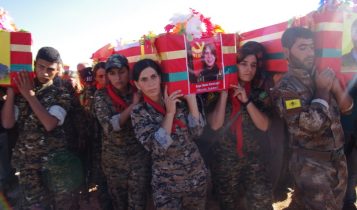 Şehîd Destan was laid to rest alongside 4 other martyrs at a ceremony in the şehîdlik in Kobanê, in a ceremony attended by thousands. As socialists themselves, her parents had always stood by their daughter’s decisions. They were there at her funeral in Kobanê. On returning to Turkey, they were both arrested and charged with “spreading propaganda for a terrorist organisation” for making a clenched fist salute and the victory sign during her funeral. Her father said, “Her last will was to be buried next to her comrades. It was my last duty to be there.” Her mother said: “ISIS killed our people in Ankara, Suruç and Diyarbakır. One day you will also understand how right Deniz is.” After nearly a year of court proceedings, they were finally acquitted.
Şehîd Destan was laid to rest alongside 4 other martyrs at a ceremony in the şehîdlik in Kobanê, in a ceremony attended by thousands. As socialists themselves, her parents had always stood by their daughter’s decisions. They were there at her funeral in Kobanê. On returning to Turkey, they were both arrested and charged with “spreading propaganda for a terrorist organisation” for making a clenched fist salute and the victory sign during her funeral. Her father said, “Her last will was to be buried next to her comrades. It was my last duty to be there.” Her mother said: “ISIS killed our people in Ankara, Suruç and Diyarbakır. One day you will also understand how right Deniz is.” After nearly a year of court proceedings, they were finally acquitted.
![]() Kendal Şengal – Ramon Maria Rull Linhoff
Kendal Şengal – Ramon Maria Rull Linhoff
Date and Place of Birth: 5 December 1962 – Madrid, Spain
Date and Place of Martyrdom: 13 May 2018 – Deir Ez-Zor
Ramon Maria Rull Linhoff hailed from Madrid in Spain. He came to Rojava to join the fight against Daesh. In Rojava he took on the name Kendal Ramor. Heval Kendal fought bravely during the operation to liberate Baghouz, one of the last bastions where ISIS still held territory.
On May 13, he was martyred by an IED planted by the Islamists while on operation to clear the village.
He was laid to rest in the martyr’s cemetery in Derik, at a ceremony attended by hundreds. Speaking on behalf of YPG International, Heqi Niviskar stated that Ramon believed in the ideals of Abdullah Öcalan’s, saying; “Kendal came from Spain to defend the honor and freedom of peoples and values of democratic nation.”
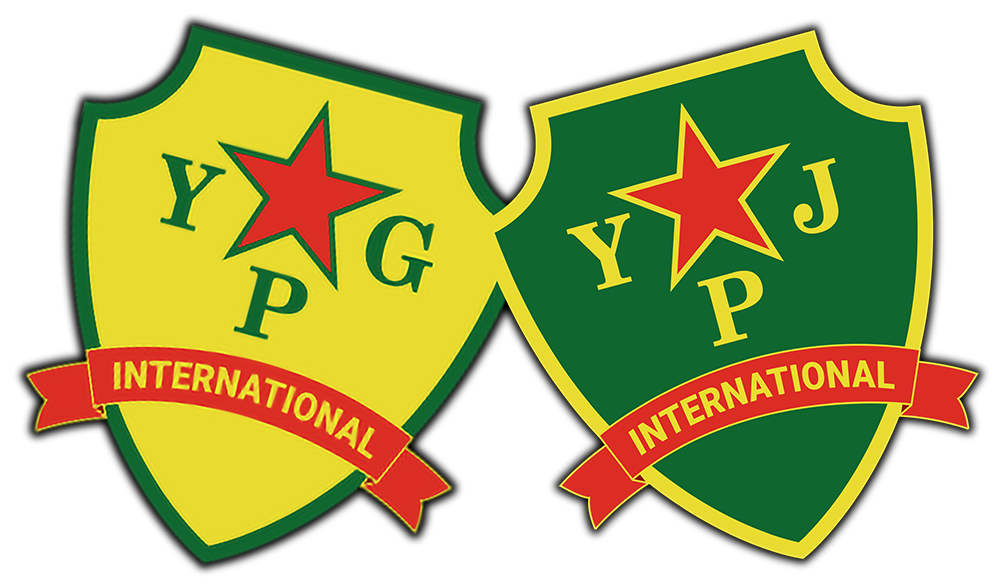
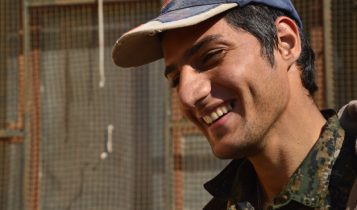
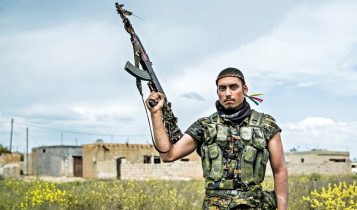
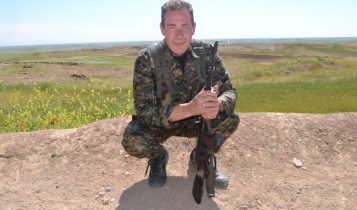 Gabar Amed – Jamie Bright
Gabar Amed – Jamie Bright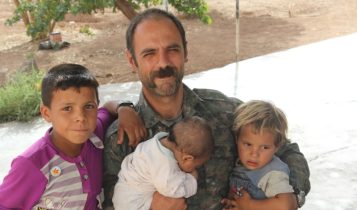
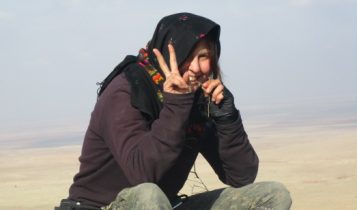 Destan Temmuz – Ayşe Deniz Karacagil
Destan Temmuz – Ayşe Deniz Karacagil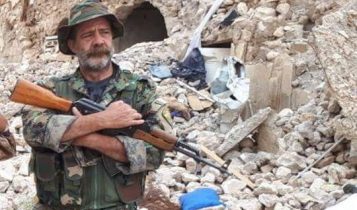 Kendal Şengal – Ramon Maria Rull Linhoff
Kendal Şengal – Ramon Maria Rull Linhoff